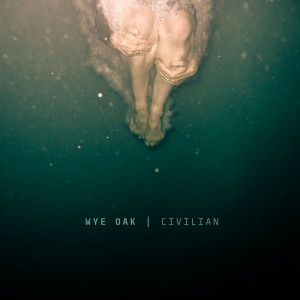Listening to Wye Oak’s third full-length release, one conclusion among many confusions is apparent: when they’re good, they’re great.
For a so-called indie-folk duo, though, it’s maybe surprising that the key component of Civilian is its unrelenting tautness. It offers little release, swaying unnervingly from archetypal folk-pop guitars to mass wall-of-sound breakdowns; Jenn Wasner’s lushly sung vocal lines offer a sense of welcome harmonic beauty that’s only heightened by the underpinning lack of emotional indulgence surrounding it.
Take the opener, ‘Two Small Deaths’: beginning with the confused sounds of several voices chattering, Andy Stack adds some bubbling keys which segue into a brief reversed melody before both abruptly halt, announcing the cyclical picked guitar section that begins the album proper. From there, the track is awash with Wasner’s crooning.
That combination is indicative of the album as a whole: while ‘Two Small Deaths’ descends into standard indie-folk, the echo of that dissonance remains and you can’t help wondering, throughout the sweet major chords of the song’s chorus and the happy triads of its middle eight, where that sinister tone went.
It’s an effect that can be found all over Civilian. A fifteen second distortion closes ‘Two Small Deaths’ and allows for the transition into ‘The Alter’ which relies, as does its predecessor, on a guitar part that circles around one refrain; the thumping single-note bass line and repetitive keyboard stabs further add to the sense that the album is taut, tight, and craving emotional release. ‘Dogs Eyes’, further, switches from speedy-folky guitars and slow, epic and loud overdriven guitar parts, in a way that seems ultimately jarring; stand out track ‘Civilian’, from which the album takes it’s name, closes with a “freak out” not unlike a full-band extension of the feedback section that bridges ‘Two Small Deaths’ and ‘The Alter’.
And yet, curiously, the album seems to lose that tension that could make it a great work; peaking at the title track, three of the last five songs ditch that confusion for a more straight forward and laid-back sound.
That’s a shame. What makes Civilian a potentially very good album is its ability to unnerve, even nauseate, in a genre that’s normally reserved for sounds that lighten. Given that, the worst thing that could happen is for that feeling to be given a chance for release; it’s also the one thing you’re always wanting it to do, only to know that you’ll feel let down once it happens. That’s a real strength. It seems like Wye Oak chose to give in to that desire and the album suffers as a result.
Nonetheless, final track ‘Doubt’, which centres on a nicely picked minor guitar section, drops the drums and the synths and hints at a genuine folkishness that feels more honest than some of the quieter tracks that precede it. Maybe if those tracks had gone down a similar road and not tried to bridge the gap between these two poles we’d be looking at a much stronger album.
Words: Chris Woolfrey

